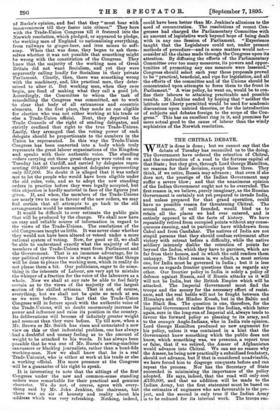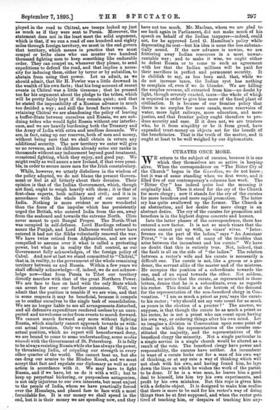THE CHITRAL DEBATE.
WHAT is done is done ; but we cannot say that the debate of Tuesday has reconciled us to the doing. The Government have ordered the retention of Chitral, and the construction of a road to the fortress capital of that State ; but they give, through Lord George Hamilton, no reasons for their decision, except these three. They think, if we retire, Russia may advance ; that even if she does not, the prestige of the Indian Government may suffer a severe blow ; and that the unanimous opinion of the Indian Government ought not to be overruled. The first reason is, we believe, purely imaginary, as the Russian Government is certainly not yet prepared to invade India, and unless prepared for that grand operation, could have no possible reason for threatening Chitral. The second reason, if well founded, would bind us to retain all the places we had ever entered, and is entirely opposed to all the facts of history. We have repeatedly retired from occupied points without any conse- quences ensuing, and in particular have withdrawn from Cabul and from Candahar. The natives of India are not stupid persons that they should confuse retirement after victory with retreat before a difficulty, while the native soldiery intensely dislike the retention of points far beyond the Indus, which they have to garrison, which are far from their homes, and in which the cold renders them unhappy. The third reason is, we admit, a most serious one, for India must be governed in India ; but it is less serious as regards frontier questions than as regards any other. Our frontier policy in India is solely a policy of defence against Russia, and if Russia attacks us it will will not be India, but the British Empire which will be attacked. The Imperial Government must find the troops and the money for the necessary effort of resist- ance, and the real battle will not be fought between the Himalaya and the Hindoo Koosh, but in the Baltic and the Black Sea. The question is one, therefore, for the Imperial Government rather than the Indian, which latter again, sure in the long-run of Imperial aid, always tends to favour the forward policy so pleasing to its army, and to the ennuyja Anglo-Indians, who in India rule opinion. Lord George Hamilton produced no new argument for his policy, unless it was contained in a hint that the Government knew something which the public does not know, which something was, we presume, a report true or false, that if we retired, the Ameer of Afghanistan would advance into Chitral. We can see no reason why the Ameer, he being now practically a subsidised feudatory, should not advance, but if that is considered unadvisable, we have forced him to disgorge conquests before and can repeat the process. Nor has the Secretary of State succeeded in minimising the importance of the policy adopted. He says, indeed, that the road will only cost £130,000, and that no addition will be made to the Indian Army, but the first statement must be based on the estimates of engineers who are favourable to the pro- ject, and the second is only true if the Indian Army is to be reduced for its internal work. The troops em- ployed in the road to Chitral, are troops locked up just as much as if they were sent to Persia. Moreover, the statement does not in the least meet the solid argument, which is that, if we run a road of one hundred and eighty miles through foreign territory, we must in the end govern that territory, which means in practice that we must compel or bribe clans who can muster two hundred thousand fighting men to keep something like endurable order. They can compel us, whenever they please, to send expeditions to defend the road, and that implies a neces- sity for inducing them, either by terror or by subsidies, to abstain from using that power. Let us admit, as we should admit, that Sir H. Fowler was a little drowned in the wealth of his own facts ; that his long account of recent events in Chitral was a little tiresome ; that he pressed too far his argument about the pledge to the tribes, which will be pretty fairly kept if they remain quiet; and that he stated the impossibility of a Russian advance in much too decided a way ; and still the broad facts remain. In retaining Chitral we are abandoning the policy of leaving a buffer-State between ourselves and Russia, we are sub- duing tribes who would fight Russia without our interfer- ence, and we are heavily burdening both the Treasury and the Army of India with extra and needless demands. We are, in fact, using up our reserves, both of men and money, without being sure that we shall obtain in return any additional security. The new territory we enter will give us no revenue, and its children already enter our ranks in thousands without any inducement beyond good treatment, occasional fighting, which they enjoy, and good pay. We might really as well annex a new Ireland, if that were possi- ble, in order to secure more men for the Irish constabulary.
While, however, we utterly disbelieve in the wisdom of the policy adopted, we do not blame the present Govern- ment or feel at all bitterly about their decision. Their opinion is that of the Indian Government, which, though not final, ought to weigh heavily with them ; it is that of first-class experts, both military and civil; and it is in accordance with the whole history of our career in India. Nothing is more evident or more wonderful than the force of the impulse which has persistently urged the British, who entered India from the sea, away from the seaboard and towards the extreme North. Clive never meant to quit Bengal Proper. The North-West was occupied in self-defence. Lord. Hardinge refused to annex the Punjab, and Lord Dalhousie would never have entered it had not the Sikhs voluntarily renewed. the war. We have twice retired from Afghanistan, and are now compelled to assume over it what is called a protesting power, but what is in reality the full control, as our Government fully acknowledges, of the foreign policy of Cabul. And now at last we stand committed to " Chitral," that is, in reality, to the government of the whole remaining territory between us and Russia. Within a few years we shall officially acknowledge—if, indeed, we do not acknow- ledge now—that from Persia to Tibet our territory directly marches with that of the great Northern Power. We are face to face on land with the only State which can arrest for ever our further extension. Well, we admit that the position is tenable if we are wise, and that in some respects it may be beneficial, because it compels us to confine ourselves to the single task of consolidation. We are no longer liable to see all arrangements disturbed, and all defensive expenditure rendered useless by an unex- pected and unwelcome order from events to march forward. We cannot march forward any more without fighting Russia, which similarly cannot approach towards us with- out actual invasion. Only we submit that if this is the actual position, which no expert will henceforward deny, we are bound to come to some understanding, some modus vivendi with the Government of St. Petersburg. It is folly to be always resisting Russia while she has always the power, by threatening India, of crippling our strength in every other quarter of the world. She cannot beat us, but she can drag our armies to the Hindoo Koosh, and we must accept that fact and regulate our diplomacy as well as our action in accordance with it. We may have to fight Russia, and if we have, let us do it with a will ; but to keep up perpetual bickering, or purposeless antagonism, is not only injurious to our own interests, but most unjust to the people of India, whom we have practically forced over the Himalaya, and placed face to face with a most formidable foe. It is our money we shall spend in the end, but it is their money we are spending now, and they have not too much. Mr. Maclean, whom we are glad to see back again in Parliament, did not make much of his- speech on behalf of the Indian taxpayer—indeed, could not, for he approved Lord G. Hamilton's policy while. deprecating its cost—but his idea is none the less substan- tially sound. If the new advance is unwise, we are frittering away Indian resources in a most unwar- rantable way ; and to make it wise, we ought either to defeat Russia or to come to such an agreement with her that the Indian millions will be paid for their sacrifices in perfect and permanent security. It is childish to say, as has been said, that, while we- do not increase taxes, the Indian ryot has nothing to complain of, even if we do blunder. We are killing the surplus revenue, all extracted from him—no doubt by light, though severely exacted, taxes—the whole of whicja. is required in order to give him more of the fixed plant of civilisation. It is because of our frontier policy that there is no surplus for more canals, more reservoirs of water, more light railways, more education, and more justice, and that frontier policy ought therefore to pro- duce security and ease. If it does not, we are trustees who, be it from stupidity or be it from greed, have expended trust-money on objects not for the benefit of the beneficiaries. That is the truth of the matter, and it ought at least to be well weighed by our diplomatists.



































 Previous page
Previous page